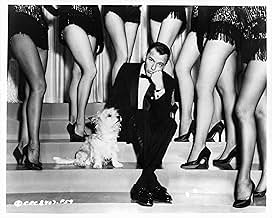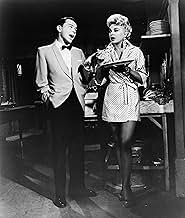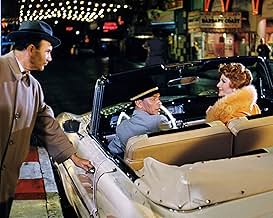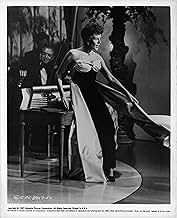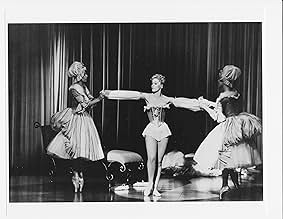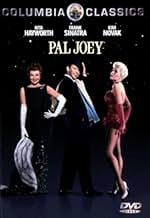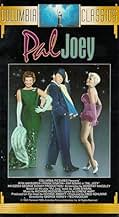IMDb-BEWERTUNG
6,6/10
6162
IHRE BEWERTUNG
Füge eine Handlung in deiner Sprache hinzuJoey Evans is a charming, handsome, funny, talented 1st class, A-Number 1 heel. When Joey meets the former chorus girl and now rich widow Vera Simpson, the pair of lecherous souls seem made ... Alles lesenJoey Evans is a charming, handsome, funny, talented 1st class, A-Number 1 heel. When Joey meets the former chorus girl and now rich widow Vera Simpson, the pair of lecherous souls seem made for each other.Joey Evans is a charming, handsome, funny, talented 1st class, A-Number 1 heel. When Joey meets the former chorus girl and now rich widow Vera Simpson, the pair of lecherous souls seem made for each other.
- Regie
- Drehbuch
- Hauptbesetzung
- Für 4 Oscars nominiert
- 3 Gewinne & 7 Nominierungen insgesamt
Franklyn Farnum
- Guest at Charity Ball
- (Gelöschte Szenen)
Bess Flowers
- Guest at Charity Ball
- (Gelöschte Szenen)
Pierre Watkin
- Mr. Forsythe
- (Gelöschte Szenen)
John Alban
- Guest at Charity Ball
- (Nicht genannt)
Leon Alton
- Printer Salesman
- (Nicht genannt)
Isabel Analla
- Undetermined Secondary Role
- (Nicht genannt)
Robert Anderson
- Policeman
- (Nicht genannt)
Monya Andre
- Guest at Charity Ball
- (Nicht genannt)
Maurice Argent
- Second Tailor
- (Nicht genannt)
Al Bain
- Club Patron
- (Nicht genannt)
Empfohlene Bewertungen
I like Sinatra as much as the next girl and then some. Probably the best thing about this film is the numbers The Chairman does alone onstage. However, I'm also well acquainted with PAL JOEY in its stage form, and this watered down film doesn't serve it well. As is so often the case with film musicals, it bears very little resemblance to the show it purports to represent.
First of all, like many other movie musicals this one is rife with interpolations. Viewers should realize that both "My Funny Valentine" and "The Lady is a Tramp" come from Rodgers and Hart's BABES IN ARMS (though, ironically, both were cut from the film version of that musical). "There's a Small Hotel" is from ON YOUR TOES and TOO MANY GIRLS gave us the haunting "I Didn't Know What Time It Was" (probably the interpolation that works best). Secondly, most of the songs they did keep don't remain intact. For instance, when they moved the setting from Chicago to San Francisco the song the club girls sing went to pot. Also, the lyrics to "Bewitched" had to be sanitized for popular consumption, which is a pity because they're some of Larry Hart's best. "Zip" was also revised and given to Vera. The witty "Take Him" was cut, which is a real pity, and several other numbers are gone entirely or reduced to underscoring.
PAL JOEY was one of the first shows to bring cynicism to the musical stage. The second you inject romance into it, you've killed what it's about. If I was just looking for a lightweight love story, I might enjoy this film. Knowing what I know now, I find it a bit tough to take.
First of all, like many other movie musicals this one is rife with interpolations. Viewers should realize that both "My Funny Valentine" and "The Lady is a Tramp" come from Rodgers and Hart's BABES IN ARMS (though, ironically, both were cut from the film version of that musical). "There's a Small Hotel" is from ON YOUR TOES and TOO MANY GIRLS gave us the haunting "I Didn't Know What Time It Was" (probably the interpolation that works best). Secondly, most of the songs they did keep don't remain intact. For instance, when they moved the setting from Chicago to San Francisco the song the club girls sing went to pot. Also, the lyrics to "Bewitched" had to be sanitized for popular consumption, which is a pity because they're some of Larry Hart's best. "Zip" was also revised and given to Vera. The witty "Take Him" was cut, which is a real pity, and several other numbers are gone entirely or reduced to underscoring.
PAL JOEY was one of the first shows to bring cynicism to the musical stage. The second you inject romance into it, you've killed what it's about. If I was just looking for a lightweight love story, I might enjoy this film. Knowing what I know now, I find it a bit tough to take.
Another marvelous effort from prolific director George Sidney, who once again displays an uncanny ability to make us wish we lived in the and time and place of his films. The classic Rogers and Hart songs selected from the smorgasbord written for the original 1940 play alone make this movie well worth a look.
Gene Kelly, a chorus boy a year earlier, was cast in the title role in the original but critically panned "Joey" of 1940. The story line for "Joey" was too sleazy and cynical for the 40's, but today comes across better than the average fare in support of many musicals of the period.
Frank Sinatra is well suited as the film-version Joey. His musical and acting styles add contemporary flavors that are as appealing in the 1950's film version as they were in the critically acclaimed 1952 revival of the play featuring Harold Lang as Joey. Frank's signature song delivery retains, but also in part redefines in a more contemporary way, the classic appeal of the best show tunes of the 40's and 50's.
Although Rita Hayworth's acting talents too often are overlooked, she is the standout actor in "Joey." Casting Kim Novak in a 50's film rather defines the genre, and while she is both appealing and likable in her role, you can't help but be aware that she is stretching her limits as an actor, singer, and dancer.
Finally, the film is a visual treat, and San Francisco a more than an adequate substitute for Chicago. Don't analyze, just sit back and enjoy.
Gene Kelly, a chorus boy a year earlier, was cast in the title role in the original but critically panned "Joey" of 1940. The story line for "Joey" was too sleazy and cynical for the 40's, but today comes across better than the average fare in support of many musicals of the period.
Frank Sinatra is well suited as the film-version Joey. His musical and acting styles add contemporary flavors that are as appealing in the 1950's film version as they were in the critically acclaimed 1952 revival of the play featuring Harold Lang as Joey. Frank's signature song delivery retains, but also in part redefines in a more contemporary way, the classic appeal of the best show tunes of the 40's and 50's.
Although Rita Hayworth's acting talents too often are overlooked, she is the standout actor in "Joey." Casting Kim Novak in a 50's film rather defines the genre, and while she is both appealing and likable in her role, you can't help but be aware that she is stretching her limits as an actor, singer, and dancer.
Finally, the film is a visual treat, and San Francisco a more than an adequate substitute for Chicago. Don't analyze, just sit back and enjoy.
George Sidney may not be one of Hollywood's best-known or most appreciated directors, but he does turn PAL JOEY into an enjoyable viewing experience by releasing it from stagebound sets and giving it an open air look that is refreshing and watchable, especially since the scene has been transferred to San Francisco rather than Chicago.
Some of the songs are borrowed from other Rodgers and Hart musicals, but when FRANK SINATRA sings standards like "There's A Small Hotel" and "The Lady Is A Tramp", he can do no wrong. He plays a no-good piano lounge lizard who has the world on a string as long as he stays one step ahead of the nightclub owner that he keeps making deals with.
The "mice" are played by RITA HAYWORTH and KIM NOVAK, Miss Hayworth making up for the badly-in-need-of-acting-coach Novak, who really stumbles in this one. Apparently George Sidney couldn't give her any guidance on how to play any of her scenes--the way Hitchcock did for "Vertigo". Their confrontation scene has no ooomph because Novak is simply not there and thus there are no real fireworks. Even so, Hayworth makes her character strong and possessive.
It's really Sinatra's show all the way and he delivers a solidly engaging performance, even though his character is lacking in what we might call integrity.
Enjoyable musical--Hayworth's "Zip" and "Bewitched" are nicely done even if she doesn't do her own vocals. The dancer magic is still there in the way she moves through any number she does.
Summing up: worth a look if you like musicals.
Some of the songs are borrowed from other Rodgers and Hart musicals, but when FRANK SINATRA sings standards like "There's A Small Hotel" and "The Lady Is A Tramp", he can do no wrong. He plays a no-good piano lounge lizard who has the world on a string as long as he stays one step ahead of the nightclub owner that he keeps making deals with.
The "mice" are played by RITA HAYWORTH and KIM NOVAK, Miss Hayworth making up for the badly-in-need-of-acting-coach Novak, who really stumbles in this one. Apparently George Sidney couldn't give her any guidance on how to play any of her scenes--the way Hitchcock did for "Vertigo". Their confrontation scene has no ooomph because Novak is simply not there and thus there are no real fireworks. Even so, Hayworth makes her character strong and possessive.
It's really Sinatra's show all the way and he delivers a solidly engaging performance, even though his character is lacking in what we might call integrity.
Enjoyable musical--Hayworth's "Zip" and "Bewitched" are nicely done even if she doesn't do her own vocals. The dancer magic is still there in the way she moves through any number she does.
Summing up: worth a look if you like musicals.
I really wanted to like this colourful adaptation of one of Rogers and Hart's last and most successful shows and attracted by big names like Sinatra, Hayworth and Novak, thought I couldn't lose. Sheesh, was I wrong.
Concerning ne'erdowell Joey (Sinatra's) self-obsessed attempts to get himself up the greasy pole to his own club in San Francisco and no doubt attendant fame and fortune, the film fails ultimately for a number of reasons. First Frank's character just isn't desperate enough, purportedly down on his luck, he always looks perfectly turned out, even before he becomes wealthy widow Hayworth's kept man. And the idea to give this hard-bitten Casanova a cute puppy dog is just wrong on so many levels. His character never seems to stop talking and often re-hashes the same stock phrases, which gets wearing after a while. As for Hayworth and Novak, both look fantastic, filmed in great clothes in great light, as befits two of the sexiest women to ever come out of Tinseltown, but the former lacks that dare I say it, Norma Desmond controlling, self-deluding and even slightly deranged conviction which would have made her character more rounded while Novak gets to play a whimpering simpering child, completely at odds with her overly sensual demeanour.
Some of the scenes are ridiculously contrived too, like Novak's strip-tease, her later passing out on Sinatra when they're on Hayworth's yacht and Joey's dream sequence when both his loves sashay around him like bees to honey. Worst of all is Hayworth's "Sugar Mommy" backing out of the competition for Joey by personally fetching Novak for their hold-hands, run-at-the-camera, big love shot at the conclusion.
On the plus side, as indicated, the stars all look great, Sinatra too, being in the middle of his classic Capitol series of recordings, even getting to quote one of his catch-phrases "Ring-a-ding-ding" at one point. The San Francisco locations are also easy on the eye and the musical numbers excellent, including "The Lady Is a Tramp", "My Funny Valentine" and "Bewitched Bothered and Bewildered" amongst them. Unfortunately, the movie dialogue too rarely matches the sharpness of Lorenz Hart's lyrics. Damon Runyan, this ain't.
A missed opportunity them and I'm not sure I can tell quite why. Some shows may just work well on stage, I'm guessing this is one of them.
Concerning ne'erdowell Joey (Sinatra's) self-obsessed attempts to get himself up the greasy pole to his own club in San Francisco and no doubt attendant fame and fortune, the film fails ultimately for a number of reasons. First Frank's character just isn't desperate enough, purportedly down on his luck, he always looks perfectly turned out, even before he becomes wealthy widow Hayworth's kept man. And the idea to give this hard-bitten Casanova a cute puppy dog is just wrong on so many levels. His character never seems to stop talking and often re-hashes the same stock phrases, which gets wearing after a while. As for Hayworth and Novak, both look fantastic, filmed in great clothes in great light, as befits two of the sexiest women to ever come out of Tinseltown, but the former lacks that dare I say it, Norma Desmond controlling, self-deluding and even slightly deranged conviction which would have made her character more rounded while Novak gets to play a whimpering simpering child, completely at odds with her overly sensual demeanour.
Some of the scenes are ridiculously contrived too, like Novak's strip-tease, her later passing out on Sinatra when they're on Hayworth's yacht and Joey's dream sequence when both his loves sashay around him like bees to honey. Worst of all is Hayworth's "Sugar Mommy" backing out of the competition for Joey by personally fetching Novak for their hold-hands, run-at-the-camera, big love shot at the conclusion.
On the plus side, as indicated, the stars all look great, Sinatra too, being in the middle of his classic Capitol series of recordings, even getting to quote one of his catch-phrases "Ring-a-ding-ding" at one point. The San Francisco locations are also easy on the eye and the musical numbers excellent, including "The Lady Is a Tramp", "My Funny Valentine" and "Bewitched Bothered and Bewildered" amongst them. Unfortunately, the movie dialogue too rarely matches the sharpness of Lorenz Hart's lyrics. Damon Runyan, this ain't.
A missed opportunity them and I'm not sure I can tell quite why. Some shows may just work well on stage, I'm guessing this is one of them.
If you read my title, that's probably all I should have to say about this one. But I'll flesh it out for you a bit. If you couldn't tell, this is one of my favorite musicals, and one of my favorite films, period. In my view, there's not a flaw to be had here--we'd have to invent one, and it would be implausible. I give plenty of 10s, but quite a few are like rating a one-scoop ice cream cone where they forgot the cone, but where there's an extra scoop of ice cream in an attractive dish to make up for it. Pal Joey is like a one-scoop ice cream cone where not only is the cone there, it's the kind of cone you love, and there are two extra scoops of ice cream that happen to be your favorite flavors.
Frank Sinatra is Joey Evans, a peripatetic musician who is also quite popular with women, but who has a reputation for not being exactly dependable or trustworthy. As the film opens he's being put on a train with a one-way ticket out of town because he was caught in an almost compromising situation with the Mayor's underaged daughter. He makes his way to San Francisco, where he sees that an old "friend"--more like an old debtee, Ned Galvin (Bobby Sherwood), is leading the band in a local club, The Barbary Coast. Joey finagles his way into a job, made more enticing to him, aside from the fact that he's broke, by the large number of very attractive women performers. But the club owner, Mike Miggins (Hank Henry), can see through his conniving ways.
Joey, who dreams of one day having his own club, begins falling for Linda English (Kim Novak), despite the fact that Ned is head over heels for her and out of all of the women, Linda is the one who wants the least to do with him. He also runs into Vera Simpson (Rita Hayworth) when he does a society gig with Ned. It seems that Vera used to be a showgirl like Linda, but she "married up". Pal Joey is largely about a love triangle between Joey, Linda and Vera.
This is an unusual romance in that for much of its length, all of the involved parties are reluctant. Linda may be attracted to Joey, but she knows better than getting involved with such a shifty womanizer. Vera is likewise cautious--especially since she has an implied history with Joey, and she now has a lot at stake. Joey is more than content to not approach commitment--he's satisfied with the string of women who continually pass through his life, who are all too happy to go out of their way to accommodate him--including doing his laundry and politely looking on and smiling when Joey puts the moves on another "mouse", as he calls them. As for Joey's interest in the two principals, it's not that he's not attracted to either, of course (what woman isn't he attracted to?), but with Vera he's playing her both for her money/social influence and to undermine what he sees as a feigned identity, and with Linda, he's initially attracted because she's playing hard to get. Both Linda and Vera also end up playing Joey to an extent to get back at him for various ethical blunders.
In addition to being intriguing for its uniqueness and relative complexity, all of this works as well as it does because the three leads are incredible performers and the script is intelligent, witty and tightly constructed. Sinatra, Novak and Hayworth are mesmerizing to watch on their own, but they all have great chemistry together, too. The characters seem tailor-made for these actors, despite the fact that the script was based on a popular Broadway show that began its run in 1940, and the Broadway show was itself based on short fiction pieces by John O'Hara that appeared in New Yorker Magazine.
Dorothy Kingsley's screenplay is loaded with subtle, quick humor in its clever dialogue. The combination of script, exemplary direction by George Sidney, and the great performances enables a number of very sophisticated dramatic moves, such as the deep backstory between Joey and Vera that is almost completely implied, and the overall atmosphere of the film, with its captivating and paradoxical combination of an ideal, romantic (in a more formal sense) world and a more earthy, cynical reality.
The atmosphere is also helped by the lush Technicolor cinematography, with some impressive shots of San Francisco, but equally attractive soundstage set-ups. It's interesting to note Kim Novak's look here, especially when she's framed against San Francisco cityscapes--it's remarkably prescient of her appearance in Hitchcock's Vertigo (1958). I suppose Pal Joey may have been why Hitchcock decided to cast Novak, and it may have influenced him a bit visually.
Before I run out of space, I should mention the music, by the incomparable duo of Richard Rodgers and Lorenz Hart, which is one of the best things about the film. Every song in Pal Joey is a gem. As a testament to how good they are, four of them--"I Could Write a Book", "The Lady is a Tramp", "My Funny Valentine", and my personal favorite, "Bewitched, Bothered and Bewildered" (the theme of the film)--have become jazz standards over the years. There have been hundreds of recordings by different artists performing them--for that matter there are hundreds of recordings of "My Funny Valentine" alone. The arrangements (partially by Nelson Riddle) and performances (especially by Sinatra, but that probably goes without saying) in the film are sublime. If you're a jazz lover, the film would be worth viewing for the music alone, but of course it offers much more than that.
Unless you simply hate musicals (in which case it's very unlikely that you've read this far), make sure you see Pal Joey at least once.
Frank Sinatra is Joey Evans, a peripatetic musician who is also quite popular with women, but who has a reputation for not being exactly dependable or trustworthy. As the film opens he's being put on a train with a one-way ticket out of town because he was caught in an almost compromising situation with the Mayor's underaged daughter. He makes his way to San Francisco, where he sees that an old "friend"--more like an old debtee, Ned Galvin (Bobby Sherwood), is leading the band in a local club, The Barbary Coast. Joey finagles his way into a job, made more enticing to him, aside from the fact that he's broke, by the large number of very attractive women performers. But the club owner, Mike Miggins (Hank Henry), can see through his conniving ways.
Joey, who dreams of one day having his own club, begins falling for Linda English (Kim Novak), despite the fact that Ned is head over heels for her and out of all of the women, Linda is the one who wants the least to do with him. He also runs into Vera Simpson (Rita Hayworth) when he does a society gig with Ned. It seems that Vera used to be a showgirl like Linda, but she "married up". Pal Joey is largely about a love triangle between Joey, Linda and Vera.
This is an unusual romance in that for much of its length, all of the involved parties are reluctant. Linda may be attracted to Joey, but she knows better than getting involved with such a shifty womanizer. Vera is likewise cautious--especially since she has an implied history with Joey, and she now has a lot at stake. Joey is more than content to not approach commitment--he's satisfied with the string of women who continually pass through his life, who are all too happy to go out of their way to accommodate him--including doing his laundry and politely looking on and smiling when Joey puts the moves on another "mouse", as he calls them. As for Joey's interest in the two principals, it's not that he's not attracted to either, of course (what woman isn't he attracted to?), but with Vera he's playing her both for her money/social influence and to undermine what he sees as a feigned identity, and with Linda, he's initially attracted because she's playing hard to get. Both Linda and Vera also end up playing Joey to an extent to get back at him for various ethical blunders.
In addition to being intriguing for its uniqueness and relative complexity, all of this works as well as it does because the three leads are incredible performers and the script is intelligent, witty and tightly constructed. Sinatra, Novak and Hayworth are mesmerizing to watch on their own, but they all have great chemistry together, too. The characters seem tailor-made for these actors, despite the fact that the script was based on a popular Broadway show that began its run in 1940, and the Broadway show was itself based on short fiction pieces by John O'Hara that appeared in New Yorker Magazine.
Dorothy Kingsley's screenplay is loaded with subtle, quick humor in its clever dialogue. The combination of script, exemplary direction by George Sidney, and the great performances enables a number of very sophisticated dramatic moves, such as the deep backstory between Joey and Vera that is almost completely implied, and the overall atmosphere of the film, with its captivating and paradoxical combination of an ideal, romantic (in a more formal sense) world and a more earthy, cynical reality.
The atmosphere is also helped by the lush Technicolor cinematography, with some impressive shots of San Francisco, but equally attractive soundstage set-ups. It's interesting to note Kim Novak's look here, especially when she's framed against San Francisco cityscapes--it's remarkably prescient of her appearance in Hitchcock's Vertigo (1958). I suppose Pal Joey may have been why Hitchcock decided to cast Novak, and it may have influenced him a bit visually.
Before I run out of space, I should mention the music, by the incomparable duo of Richard Rodgers and Lorenz Hart, which is one of the best things about the film. Every song in Pal Joey is a gem. As a testament to how good they are, four of them--"I Could Write a Book", "The Lady is a Tramp", "My Funny Valentine", and my personal favorite, "Bewitched, Bothered and Bewildered" (the theme of the film)--have become jazz standards over the years. There have been hundreds of recordings by different artists performing them--for that matter there are hundreds of recordings of "My Funny Valentine" alone. The arrangements (partially by Nelson Riddle) and performances (especially by Sinatra, but that probably goes without saying) in the film are sublime. If you're a jazz lover, the film would be worth viewing for the music alone, but of course it offers much more than that.
Unless you simply hate musicals (in which case it's very unlikely that you've read this far), make sure you see Pal Joey at least once.
Wusstest du schon
- WissenswertesThis is one of Frank Sinatra's few post-Verdammt in alle Ewigkeit (1953) movies in which he did not receive top billing, which surprisingly went to Rita Hayworth. Sinatra was, by that time, a bigger star, and his title role was predominant. When asked about the billing, Sinatra replied, "Ladies first." He was also quoted as saying that, as it was a Columbia film, Hayworth should have top billing because, "For years, she WAS Columbia Pictures", and that with regard to being billed "between" Hayworth and Kim Novak, "That's a sandwich I don't mind being stuck in the middle of." As Columbia's biggest star, Hayworth had been top billed in every film since Es tanzt die Göttin (1944), but her tenure was soon to end with Sie kamen nach Cordura (1959).
- PatzerIn the opening scene, Joey is escorted onto a train leaving town. Spengler's Fish Grotto is visible in the background, placing this in W Berkeley (though the police car reads "Gold City.") The train is headed north. Next, we see Joey exiting the train heading towards the "Ferry to SF" which would've been one of the Oakland stations, which is just a few minutes South of Berkeley.
- Zitate
Joey Evans: After all, two years is a long time between... drinks.
- VerbindungenEdited into The Green Fog (2017)
- SoundtracksThere's A Small Hotel
(uncredited)
Music by Richard Rodgers
Words by Lorenz Hart
Performed by Frank Sinatra
Top-Auswahl
Melde dich zum Bewerten an und greife auf die Watchlist für personalisierte Empfehlungen zu.
- How long is Pal Joey?Powered by Alexa
Details
Box Office
- Weltweiter Bruttoertrag
- 5.660 $
- Laufzeit
- 1 Std. 51 Min.(111 min)
Zu dieser Seite beitragen
Bearbeitung vorschlagen oder fehlenden Inhalt hinzufügen


